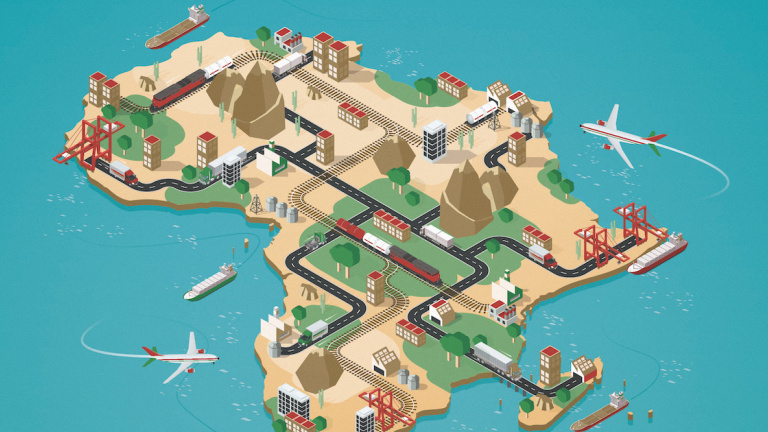
A ‘business unusual’ approach for gender equality under the AfCFTA
The AfCFTA can advance gender equality in Africa. But governments, businesses, civil society and development partners need to pursue a ‘business unusual’ approach to ensure that it does.
The AfCFTA and gender equality
To deliver on its transformative potential, the African Continental Free Trade Area (AfCFTA) needs to support the creation of decent jobs, reduce inequalities and promote sustainable, inclusive development. Advancing gender equality is key to achieving these objectives.
Women play a significant role in trade in Africa and will be essential to the continent’s success in leveraging the full potential of the AfCFTA. Most entrepreneurs in Africa are women, but women continue to face challenges and obstacles that limit their competitiveness and make their businesses less productive than those owned by men. Women also comprise the vast majority of informal cross-border traders in Africa, though these female traders are disproportionately affected by non-tariff barriers (NTBs), including corruption, harassment, misinformation about customs procedures and regulations and confiscation of goods.
The AfCFTA Agreement explicitly recognises the importance of gender equality. Article 3(e) specifies that the AfCFTA aims to “promote and attain sustainable and inclusive socio-economic development, gender equality and structural transformation”. Likewise, Article 27(d) of the AfCFTA Protocol on Trade in Services makes explicit reference to improving the export capacity of formal and informal service suppliers, with particular attention to micro, small and medium-sized operators and “women and youth service suppliers”.
How will the AfCFTA impact women?
Women are not a homogenous group. AfCFTA implementation will affect them differently, depending on characteristics like their education, experience, location and role in the economy. Understanding the gendered impact of intra-African trade liberalisation is therefore critical to ensuring equality of opportunity for women and men under the AfCFTA.
The AfCFTA’s impact on African agricultural trade is particularly relevant for women. Agriculture is the backbone of the African economy, and women represent about half the labour force in the sector. The AfCFTA can promote women’s economic empowerment by providing them with expanded access to regional food markets and stimulating demand for intra-African food imports. Smallholder female farmers in particular could benefit from opportunities to integrate their activities into regional agricultural value chains and higher value-added agro-processing activities. At the same time, however, female farmers in some African countries may be adversely affected by increased food imports from other AfCFTA member states.
The AfCFTA’s impact on Africa’s industrial and services sectors is also relevant to gender equality. Export-oriented industrialisation can have significant gender-specific effects. For example, the creation of export processing zones in some African countries has brought women new opportunities in manufacturing, but kept the majority confined to low-paid and unskilled jobs.
Similarly, Africa’s expanding services sector has brought formal, skill-intensive jobs for some highly educated women, but the majority of women in the sector have remained trapped in poorly paid occupations, including street hawking.
Across all sectors, the AfCFTA will expand opportunities for intra-African trade. In doing so it can promote entrepreneurship and economic opportunities for women-owned SMEs and microenterprises in the formal and informal sector.
Benefits won’t come automatically
While the AfCFTA will create new opportunities for women’s employment and entrepreneurship, it won’t automatically benefit women. Indeed, evidence suggests that the pervasive gender gap in access to finance, productive resources and assets, will limit the ability of women to seize opportunities created by the AfCFTA in agriculture. Research by the United Nations Conference on Trade and Development (UNCTAD) suggests that female farmers need improved access to productive resources, training, skills and technology, and greater know-how in order to overcome market access barriers such as phytosanitary standards, technical barriers to trade and product regulations, and to benefit from expanded markets and related opportunities.
In the industrial sector, greater efforts need to be made to provide women with access to technical education and on-the-job training. In the services sector, too, women need access to information and communication technologies (ICTs), business networks, technical knowledge and skills to enable them to land higher-skilled services jobs. Targeted entrepreneurship training, for example, has been identified as one way to help women entrepreneurs grasp the opportunities that open markets create.
African countries can help ensure that women benefit from the opportunities created by the AfCFTA by adopting a gender-sensitive approach to implementation of AfCFTA provisions that directly affect women. These include provisions on customs cooperation and mutual administrative assistance, trade facilitation, NTBs, technical barriers to trade and sanitary and phytosanitary measures. Such an approach can help remove procedural obstacles and tackle the gender-specific barriers confronting women.
The introduction of a continent-wide Simplified Trade Regime (STR) that is sensitive to the needs of small-scale female traders, can help bring such traders into the formal trading system and support their participation in new trade and business opportunities created by the AfCFTA. Likewise, targeted policy interventions that address gender-specific impediments could further improve the productivity and competitiveness of female-owned enterprises, allowing them to grow and to exploit opportunities created by the AfCFTA.
Gender mainstreaming in national AfCFTA strategies
Given the importance of gender-sensitive implementation, gender mainstreaming represents a key strategy for promoting gender equality through the AfCFTA. In 2019, the United Nations Economic Commission for Africa (ECA) supported 15 African countries to develop national AfCFTA implementation strategies. Gender mainstreaming was central in the design of these strategies. This process entailed understanding how women contribute to and participate in trade, particularly in the priority economic sectors of agriculture, manufacturing and services – as sectors expected to gain new trade opportunities through the AfCFTA. It also involved examining gender-specific constraints that confront female workers, producers, entrepreneurs and traders, and identifying new trade and economic opportunities to catalyse women’s employment and entrepreneurship.
Gender mainstreaming can help policymakers gain a better understanding of the economic activities and subsectors in which women are concentrated. The main components of the approach are considering the factors that may block women’s access to economic opportunities in priority sectors, and analysing gender differences in access to productive inputs (particularly finance). Gender mainstreaming can also be used to identify non-traditional sectors and products with high export potential, as well as regional value chains that could have positive socio-economic impact, specifically in creating decent jobs for women.
Informed by relevant information and statistics on gender and trade, findings from the gender mainstreaming in the national AfCFTA strategies are guiding the wider development of gender-responsive policies and context-specific interventions to advance the full, equal and meaningful participation of women in the AfCFTA.
A ‘business unusual’ approach for gender equality within the AfCFTA
The countries that have developed national AfCFTA strategies now need to implement them. In doing so, all stakeholders – including African governments, the private sector, civil society and development partners – need to collaborate on a ‘business unusual’ approach to support the equal participation of women. Such an approach requires the mobilisation of financial resources – from AfCFTA member states and from external partners supporting the AfCFTA – for capacity building, skills development and the collection of gender-disaggregated data, among other interventions. In this way, AfCFTA implementation can promote the objective of gender equality and contribute to sustainable, inclusive human development. All stakeholders have responsibilities in this regard.
African governments have a key role to play. In particular they should:
● Prioritise the appointment of national focal points to advance the implementation of the AfCFTA non-tariff barriers online mechanism.
● Establish a continental simplified trade regime that brings informal cross-border traders into the formal trading system and supports their participation in new trade opportunities created by the AfCFTA.
● Design and implement gender-responsive policies and complementary measures that address pervasive gender gaps and advance women’s participation in the agricultural sector, as well as policies that encourage employers to hire more women and to empower them with ICTs, technical skills and on-the-job training to access higher-skilled manufacturing and services jobs.
● Integrate a gender dimension in the AfCFTA negotiations on trade in services.
● Implement a trade facilitation agenda to improve safety and reduce the time and cost involved in trading, particularly for small-scale female traders; this agenda should also incorporate gender-sensitive training for customs officials on their obligations in line with the AfCFTA Agreement.
● Provide women with targeted skills development and training in local content and rules of origin requirements, sanitary and phytosanitary measures, and other technical requirements to meet AfCFTA trade standards.
● Collect gender statistics and conduct analysis to inform gender-responsive policies.
● Involve civil society, including organisations representing female traders and women’s business associations, in national AfCFTA committees.
● Provide gender training for trade negotiators, to create a stronger understanding among technical officials of the links between trade and gender.
Investors and other private sector actors also have a role to play by:
● Advocating for and investing in women’s employment, entrepreneurship and economic empowerment, including through public-private partnership schemes.
● Supporting mentorship, networks, information-sharing and on-the-job training, re-training, technical education and skills development for women in sector-specific activities.
● Increasing the access of women-owned businesses to corporate supply chains.
● Improving women’s access to finance through a range of innovative financing instruments ranging from microloans to venture capital.
Civil society, meanwhile, needs to:
● Lead proactive awareness and advocacy campaigns on the AfCFTA to articulate the priority needs and concerns of women and to help women identify and exploit new opportunities under the AfCFTA.
● Monitor and assess the progress of AfCFTA implementation, to ensure that implementation reflects the needs and priorities of vulnerable groups in general, and of women in particular.
Finally, the next step for development partners will be to use outcomes from the gender mainstreaming in the national AfCFTA strategies to design targeted programmes that support women’s economic empowerment and ensure women’s participation in and benefit from the AfCFTA. These programmes should incorporate and expand on relevant research, trade and market intelligence, sectoral and regional value chain analyses, capacity building and training.
About the author
Nadira Bayat is a gender and trade consultant with the African Trade Policy Centre (ATPC)–United Nations Economic Commission for Africa (ECA). She was previously programme director at Global Economic Governance (GEG) Africa — a policy research and stakeholder engagement programme, focusing on sustainable development priorities in Africa.
Read the full magazine issue








